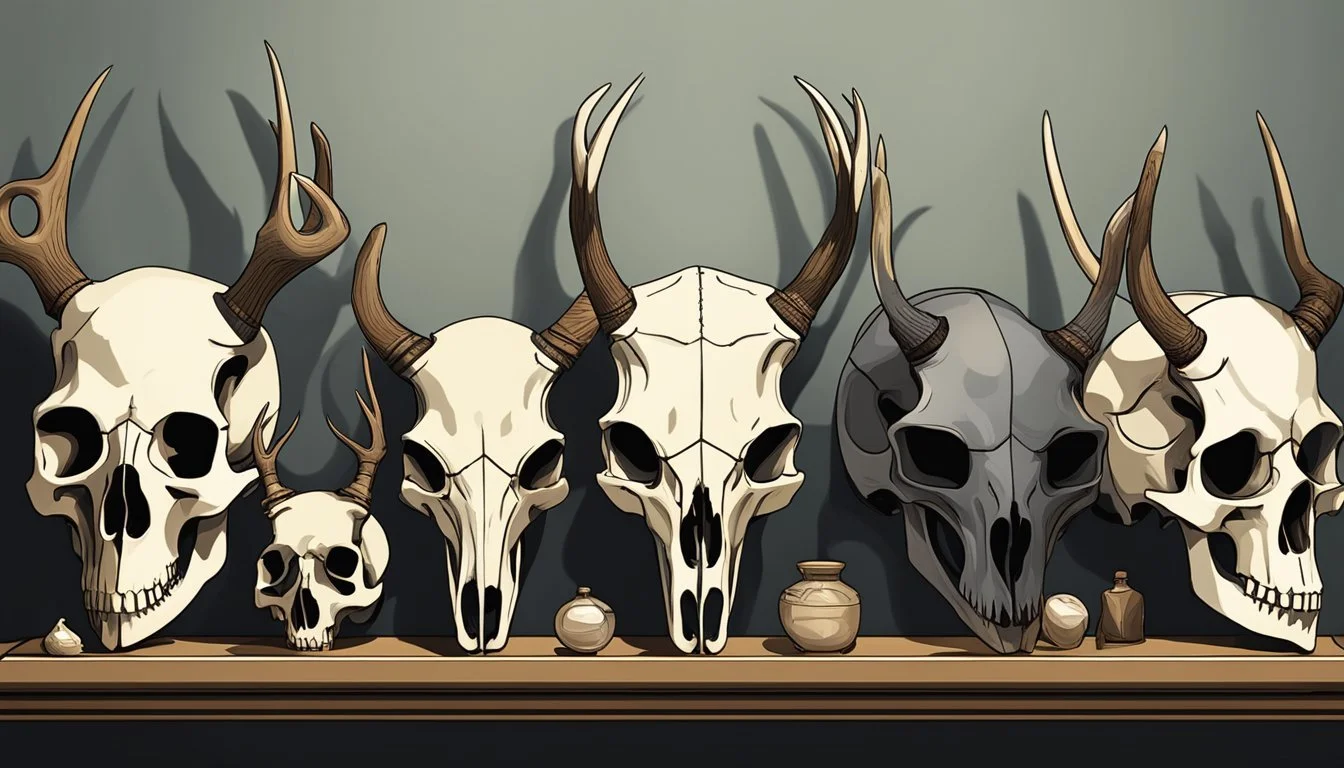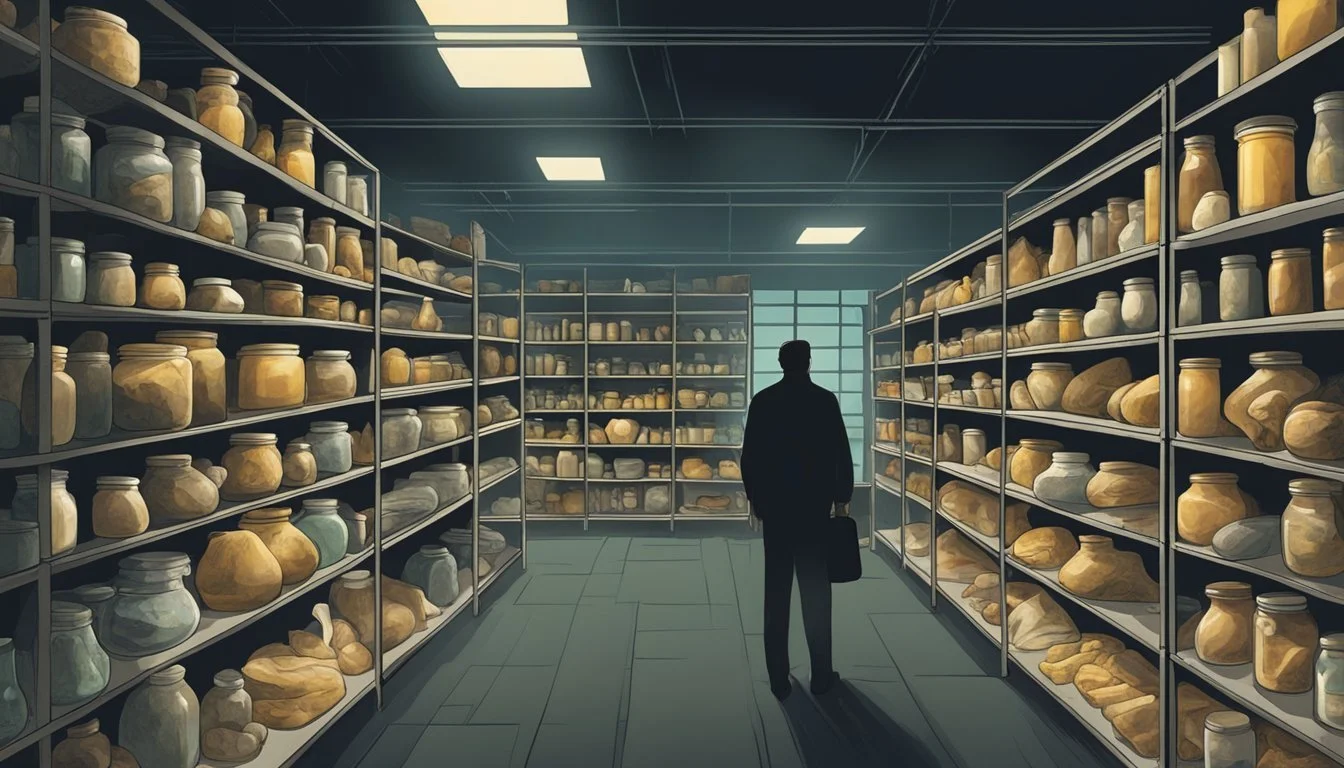8 Disturbing Documentaries on Human Trophy Collecting and Body Part Trafficking
Exposing the Dark Underbelly of Illegal Trade
Documentaries exploring the dark world of human trophy collecting and body part trafficking shed light on a disturbing underground industry. These films expose the illegal trade in human remains and organs, revealing networks of criminals who exploit vulnerable populations for profit. They provide a sobering look at the global scope of this illicit market.
Through interviews, undercover footage, and expert analysis, these documentaries uncover the methods used to obtain and sell human body parts internationally. They examine the motivations of both buyers and sellers, as well as efforts by law enforcement to combat these crimes. While difficult to watch at times, these films play an important role in raising awareness about an often overlooked form of human exploitation.
1) 'Tales of the Grim Sleeper' by Nick Broomfield
Nick Broomfield's 2014 documentary 'Tales of the Grim Sleeper' examines the case of Lonnie David Franklin Jr., a serial killer who terrorized South Central Los Angeles for 25 years. The film delves into the community where Franklin lived and the lives he impacted.
Broomfield explores how Franklin evaded capture for so long, targeting primarily African American women in an area plagued by poverty and neglect. The documentary sheds light on systemic issues within law enforcement and society at large.
Through interviews with Franklin's neighbors, survivors, and victims' families, the film paints a disturbing picture of a killer who operated with impunity. It raises questions about the value placed on certain lives in marginalized communities.
'Tales of the Grim Sleeper' arrived at a time of heightened tensions between police and communities of color. The documentary introduces the term "NHI" or "no human involved," reflecting the dismissive attitude towards some victims.
Broomfield's work serves as both a true crime investigation and a scathing indictment of societal failures. It exposes how neglect and indifference allowed a predator to continue his crimes for decades.
2) 'Cannibal Warlords of Liberia' by Vice
'Cannibal Warlords of Liberia' is a documentary produced by Vice that examines the aftermath of Liberia's 14-year civil war. The film takes viewers into the heart of a country still grappling with the consequences of prolonged conflict.
Vice's team travels to West Africa, providing an on-the-ground look at the challenges faced by Liberian citizens. The documentary focuses on former child soldiers and their struggle to reintegrate into society.
One of the most shocking aspects explored is the presence of ex-warlords who have transitioned into self-proclaimed community leaders. These individuals, some with alleged histories of cannibalism during the war, now wield influence in post-conflict Liberia.
The film showcases the stark realities of life in a nation attempting to rebuild. It highlights the complexities of reconciliation and the difficulties in overcoming a violent past.
Through interviews and raw footage, 'Cannibal Warlords of Liberia' offers a glimpse into the lives of those affected by the war. The documentary serves as a powerful reminder of the long-lasting impacts of conflict on individuals and communities.
3) 'The Act of Killing' by Joshua Oppenheimer
Joshua Oppenheimer's 2012 documentary 'The Act of Killing' offers a chilling look into the minds of Indonesian death squad leaders. The film focuses on Anwar Congo and his associates, who were responsible for mass killings during Indonesia's 1965-66 communist purge.
Oppenheimer takes an unconventional approach by asking these men to reenact their crimes through cinematic scenes. This unique method reveals the perpetrators' attitudes towards their past actions and the lasting impact of violence on their psyche.
The documentary explores how these killers, who have never faced justice, view themselves as heroes rather than criminals. It showcases their boastful recollections of torture and murder, highlighting the disturbing lack of remorse.
As the film progresses, cracks begin to appear in Anwar's bravado. His participation in the reenactments leads to moments of introspection and apparent discomfort with his past deeds.
'The Act of Killing' serves as a powerful examination of impunity, memory, and the psychological effects of committing atrocities. It challenges viewers to confront uncomfortable truths about human nature and the capacity for evil.
4) 'The Jinx: The Life and Deaths of Robert Durst' by Andrew Jarecki
'The Jinx: The Life and Deaths of Robert Durst' is a gripping HBO documentary series directed by Andrew Jarecki. The six-part series explores the complex life of Robert Durst, a real estate heir suspected of multiple murders.
Jarecki's investigation delves into three cases linked to Durst: the disappearance of his wife Kathie in 1982, the murder of his friend Susan Berman in 2000, and the death of his neighbor Morris Black in 2001.
The documentary features extensive interviews with Durst himself, providing a rare glimpse into the mind of an alleged killer. Jarecki's careful questioning and presentation of evidence create a compelling narrative.
'The Jinx' gained notoriety for its shocking finale, where Durst appeared to inadvertently confess to the murders while still wearing a live microphone. This moment led to Durst's arrest and subsequent trial.
The series combines archival footage, interviews, and reenactments to paint a detailed picture of Durst's life and the crimes he was suspected of committing. Jarecki's work demonstrates the power of documentary filmmaking in uncovering long-buried truths.
5) 'Trophy' by Shaul Schwarz and Christina Clusiau
'Trophy' explores the complex world of big-game hunting and wildlife conservation. Released in 2017, this documentary offers a multifaceted look at the controversial practice of trophy hunting in Africa.
Directors Shaul Schwarz and Christina Clusiau use high-definition cameras and drones to capture stunning footage. They present various perspectives on the issue, including those of hunters, conservationists, and local communities.
The film delves into the economics of wildlife preservation and the role of hunting in conservation efforts. It raises questions about the commodification of endangered species and the ethics of killing animals for sport.
'Trophy' examines the intersection of big business and animal protection. It showcases the complex relationships between hunting, tourism, and wildlife management in African nations.
The documentary avoids taking a clear stance, instead presenting viewers with the nuanced reality of the situation. It encourages audiences to consider the various factors at play in this contentious issue.
6) 'Deliver Us From Evil' by Amy Berg
'Deliver Us From Evil' is a 2006 documentary directed by Amy Berg. The film focuses on Oliver O'Grady, a former Catholic priest who admitted to molesting and raping numerous children in Northern California.
Berg's documentary explores O'Grady's actions and the Catholic Church's response. It reveals how the Church repeatedly moved O'Grady to different parishes when allegations surfaced, effectively enabling his continued abuse.
The film features interviews with O'Grady himself, as well as his victims and their families. It provides a haunting look at the long-lasting impact of childhood sexual abuse.
'Deliver Us From Evil' received critical acclaim for its unflinching portrayal of a deeply disturbing subject. It won the Best Documentary Award at the 2006 Los Angeles Film Festival.
The documentary serves as a powerful indictment of institutional cover-ups and the prioritization of an organization's reputation over the safety of children. It sparked important conversations about accountability within religious institutions.
7) 'Killer Legends' by Joshua Zeman
'Killer Legends' is a 2014 documentary directed by Joshua Zeman. The film explores the origins of several well-known urban legends and the true crimes that may have inspired them.
Zeman and co-investigator Rachel Mills examine four infamous stories: the hook-handed killer, the killer clown, the babysitter and the man upstairs, and the candy man. They visit locations associated with these legends and interview experts.
The documentary delves into the Texarkana Moonlight Murders, which are linked to the hook-man legend. It also investigates the real-life crimes that potentially spawned other urban myths.
'Killer Legends' blends elements of true crime and folklore. It analyzes how these stories spread through popular culture, including film and television adaptations.
The film features visits to spooky locations where actual crimes occurred. It includes interviews with historians, folklorists, and law enforcement officials to provide context for the legends and their factual bases.
8) 'There's Something Wrong with Aunt Diane' by Liz Garbus
'There's Something Wrong with Aunt Diane' is a 2011 documentary film directed by Liz Garbus. It examines the tragic 2009 Taconic State Parkway crash in New York.
The film investigates the circumstances surrounding Diane Schuler, who drove the wrong way on the parkway, causing a collision that killed eight people, including herself. It premiered on HBO on July 25, 2011.
Garbus explores the complexities of the case, questioning whether Schuler was truly a reckless drunk driver or if there were other factors at play. The documentary delves into Schuler's life and the events leading up to the crash.
The film includes interviews with family members and experts, presenting various perspectives on the incident. It aims to uncover the truth behind the crash and understand Schuler's actions.
Garbus, an acclaimed documentarian, takes a thorough approach to the subject matter. She examines evidence, testimonies, and conflicting reports to paint a comprehensive picture of the tragedy.
The documentary sparked discussions about the case and raised questions about substance abuse, mental health, and the complexities of human behavior in seemingly inexplicable situations.
Understanding Trophy Collecting
Trophy collecting involves acquiring and displaying objects associated with victims. This practice has a long and disturbing history, rooted in both cultural traditions and individual psychology. Collectors are often motivated by a desire for power, control, and mementos of their acts.
Historical Context
Trophy collecting dates back centuries in warfare and hunting. Ancient cultures took body parts of defeated enemies as symbols of victory. In the 19th century, colonizers collected artifacts and human remains from indigenous peoples. During World War II, some soldiers took personal items from dead enemies as souvenirs.
In modern times, serial killers have notoriously collected "trophies" from victims. Items like jewelry, clothing, or body parts serve as reminders of their crimes. Law enforcement now recognizes trophy collecting as potential evidence in violent crimes.
Psychological Motivations
Trophy collectors often seek to relive their experiences and maintain a sense of power over victims. The objects serve as tangible proof of their acts. Some view trophies as extensions of the victims themselves.
For some, the act of collecting feeds compulsive or addictive tendencies. The thrill of acquiring new items can become a driving force. Trophy displays may boost the collector's ego and sense of accomplishment.
Deeper psychological issues like narcissism, lack of empathy, and sadism frequently play a role. The trophies objectify victims, allowing the collector to avoid seeing them as human. This dehumanization enables further violence and exploitation.
Mechanisms of Body Part Trafficking
Body part trafficking operates through complex global networks, exploiting legal loopholes and ethical gray areas. Criminal organizations coordinate supply chains across borders to meet demand for organs and tissues.
Global Networks and Supply Chains
Traffickers recruit vulnerable individuals as organ donors through coercion or deception. They often target poor communities in developing countries. Brokers arrange transportation and documentation for donors and recipients.
Underground clinics and corrupt medical professionals perform illegal transplant surgeries. Organs are sometimes harvested from deceased individuals without consent.
Trafficking networks use sophisticated methods to evade detection. They employ encrypted communications and frequently change routes and methods.
Legal and Ethical Issues
Many countries lack comprehensive laws against organ trafficking. Enforcement is often weak where laws do exist.
Traffickers exploit differences in regulations between countries. They may conduct donor recruitment in one nation and perform surgeries in another.
The high demand for transplants creates ethical dilemmas for medical professionals. Some argue for regulated organ markets to reduce illegal trafficking.
Combating trafficking requires international cooperation. Efforts focus on strengthening laws, improving transplant monitoring, and addressing root causes like poverty.









